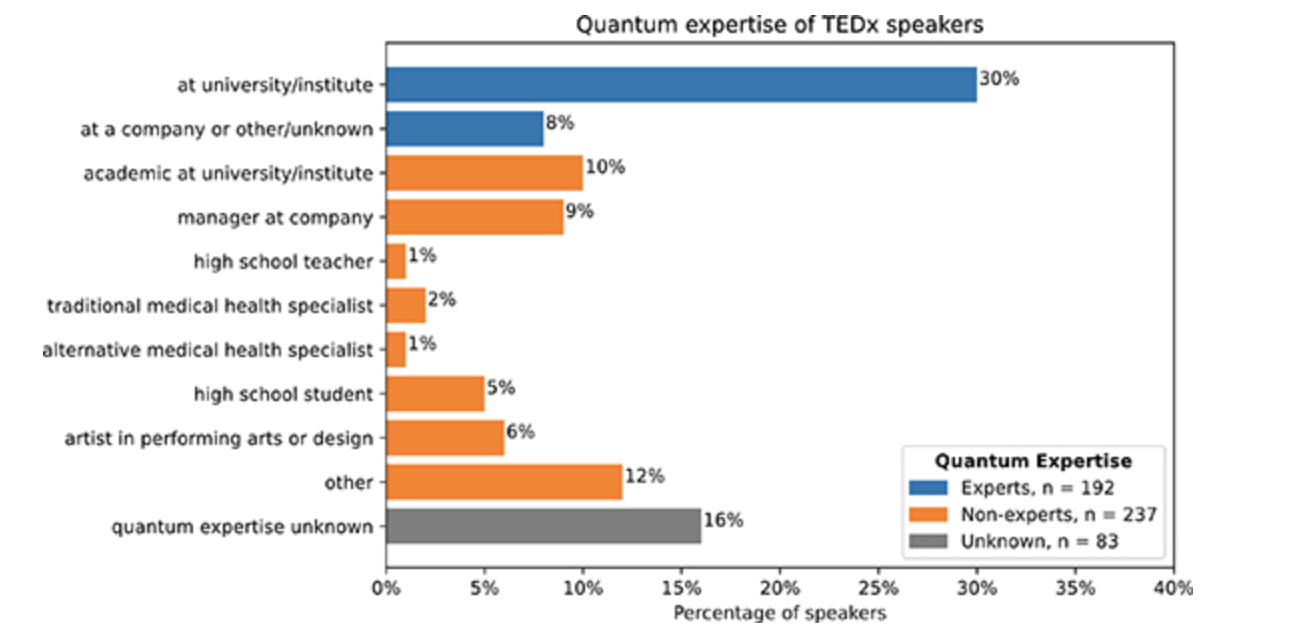Insider Brief
- A Leiden University-led study looked at how people communicated about quantum science and technology.
- Among the findings: speakers often focus on spooky aspect of quantum technology, quantum computing is mostly the focus of the talks.
- Experts tended to explain underlying quantum concepts and discuss risks and challenges, while non-experts tended to focus more on the potential benefits of quantum science and technology.
With headlines about revolutionizing computing to disrupting cryptography, quantum science and technology is gaining more and more attention.However, science communication experts are increasingly concerned about how quantum science and technology are framed in popular communication.
In a study, the Leiden University-led team of researchers conducted a content analysis of 501 TEDx talks to investigate how quantum science and technology are portrayed and communicated. The researchers spotted several potential issues related to the popularization of quantum science and technology, including the tendency for speakers to frame quantum science and technology as spooky and enigmatic, with about a quarter of the analyzed talks using such language. This framing can contribute to a mystified perception of quantum science, making it seem inaccessible or incomprehensible to the general public.
Leiden University doctoral student Aletta Meinsma, who was first author of the study, said that science communication is important for the emerging quantum field.

“We want to understand how to engage in social dialogue around quantum technology,” Meinsma said in a university release.
The researchers found that only about half of the talks explained underlying quantum concepts of quantum 2.0 technology, such as superposition, entanglement, or contextuality. This lack of explanation could hinder the audience’s understanding of the fundamental concepts behind quantum science and technology, leading to misconceptions or misinterpretations.
Quantum technology was also often narrowly framed in terms of public good, with six times more talks mentioning benefits than risks. This positive bias could overlook potential ethical, social, and security concerns associated with quantum science and technology, leading to an incomplete understanding of their implications.
The study revealed that there was a strong focus on quantum computing in the talks, with other quantum technologies receiving less attention. This unbalanced representation could result in an incomplete and skewed perception of the broader landscape of quantum science and technology, which encompasses various areas beyond computing, such as communication, sensing, and simulation.
Interestingly, the researchers, who published their findings in Quantum Science and Technology, found differences in communication patterns between quantum experts, such as quantum scientists and industry leaders, and non-experts, such as scientists from other disciplines and artists. Experts were more likely to explain underlying quantum concepts and discuss risks and challenges, while non-experts tended to focus more on the potential benefits of quantum science and technology.
The findings of this study highlight the presence of potential issues in the popular communication of quantum science and technology, although they are not predominant in TEDx talks.
The team said that further research is needed to understand the impact of these communication patterns on public perceptions of quantum science and technology. Improved communication that addresses these issues could contribute to a more accurate and informed understanding of the promises and challenges of quantum science and technology among the general public, according to the researchers.
Meinsma said she hopes the findings inform how experts communicate about quantum to the public.
‘My ambition is that scientists check with themselves how they can bring their story in such a way that it is valuable to the public,” Meinsma said. “For example, not just talking about the benefits, but thinking more broadly about the benefits as well as the risks. In this way, we can create more support for quantum technologies even before they actually exist.”
To conduct the study, the researchers first downloaded all the transcripts of the collected TEDx talks and checked whether each transcript contained the keyword ‘quantum’. They deleted transcripts that did not mention quantum, resulting in a total of 1002 transcripts. They then discarded transcripts without English translation, leaving 796 automatically and 184 manually transcribed talks. Researchers also reviewed the remaining content to make sure the mention of quantum referred to quantum science or quantum technology and not just a popular cultural reference, for example.
Finally, researchers relied on coding — a technique that scientists use to systematically analyze content — that consisted of two phases based on predefined codebooks.
The research team also included Sanne Willemijn Kristensen, W Gudrun Reijnierse, Ionica Smeets and Julia Cramer.
If you found this article to be informative, you can explore more current quantum news here, exclusives, interviews, and podcasts.















